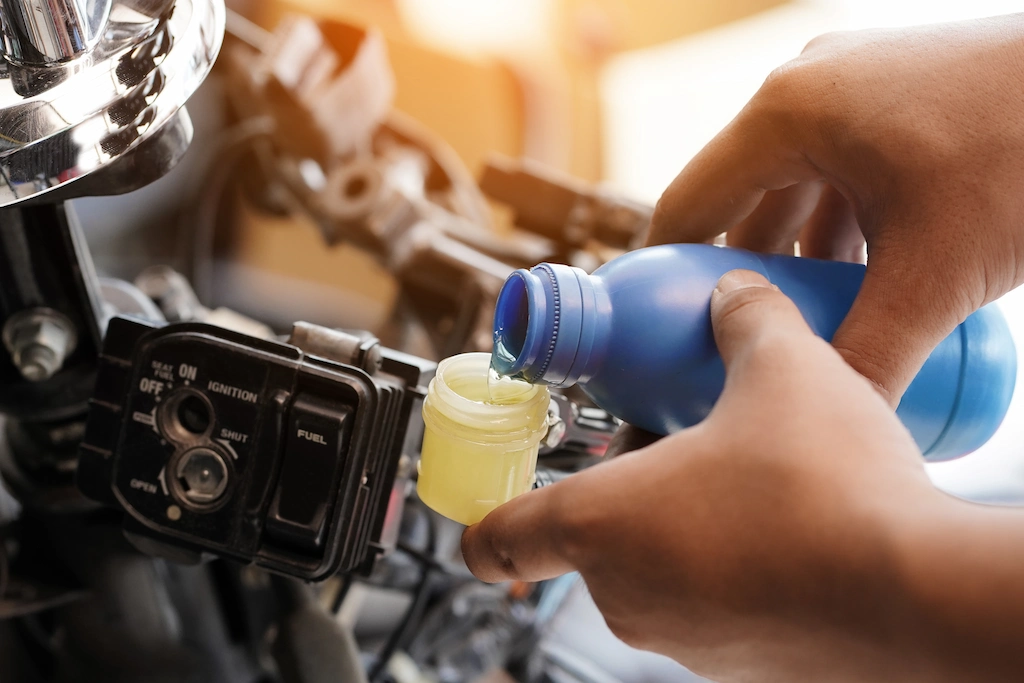Let's consider in detail the hydraulic equipment mistakes, which occur more often than others. Performing maintenance as needed will save you time and money.

There are many small components that make up hydraulic systems, and therefore many opportunities for mistakes. These errors, whether they’re related to hydraulic fluid or filters, can be detrimental to your system. These mistakes can decrease productivity, increase costs, and cause accelerated wear without hydraulic maintenance.
However, some mistakes are more common than others and we’ve listed them below so you can add them to your checklist.
When to change hydraulic oil is an important decision to make and it is a common mistake to do it at the wrong time, as this increases costs and risk of contamination. But, how often should the hydraulic fluid be changed? The answer is: not as often as you might think.
The two primary instances where changing the oil are when the base oil begins to degrade or when the additive package is depleted. There is no set amount of time at which these situations occur, so it is important to base it on the number of hours in service and, more importantly, after determining the condition of the oil.
Well-maintained hydraulic oil can last a very long time, often longer than the manufacturer will dictate in the system’s manual or guidelines. Changing the hydraulic fluids prematurely is wasteful and not cost-effective. But changing the oil too late will compromise the function and life expectancy of the system.
To determine if the additives have been depleted and if the hydraulic fluids need changing, oil analysis is a helpful tool. Heat, water, and contamination are usually the culprits for prematurely degraded oil. To prevent hydraulic oils’ degradation and lengthen the hydraulic oil replacement interval the operator should monitor:

A very common hydraulic system mistake is using the wrong hydraulic oil. Hydraulic oil has many roles; it serves as a lubricant, prevents oxidation, and is how power is transmitted throughout hydraulic machinery.
It’s essential to use hydraulic fluid with the right viscosity, to avoid high operating temperatures or increased friction that can cause damage to the system and potentially premature failure. The wrong oil can also cause increased power usage, both diesel, and electric, at the expense of your business.
Be sure to read the manufacturer recommendations but do your own research and consult an expert to determine what the best oil is for your hydraulic system. Not to mention, check the hydraulic oil viscosity index.
If the viscosity of the hydraulic fluid is too high, it can cause many potential problems. First, early, increased wear because high viscosity fluid cannot adequately lubricate the necessary components of the hydraulic system.
Also, if these parts aren’t properly lubricated because the fluid viscosity is too high, then there will be more friction, which will force the system to require more power to work properly; this will, in turn, decrease the efficiency of the system and cost you time and money.
Similarly, if the hydraulic oil viscosity is too low, various problems can occur. It will inevitably result in contamination, which will accelerate wear and reduce efficiency. Also, the component parts will not be properly protected while the system is in operation. This will lead to exacerbated wear and can even cause certain components, like pumps and motors, to fail prematurely.

A similar situation to not changing the oil, and changing the filters of your hydraulic system at the wrong times is an avoidable error. Unnecessary filter changes are wasteful, as the filter’s capacity will not have been fully utilized, costing your business extra money. However, more importantly, not changing the filters enough can be harmful to the overall system as the oil will get contaminated.
Not changing the filter in time will cause clogging, resulting in a bypass of hydraulic fluid, meaning the fluid no longer passes through a filter, and there will be nothing preventing particles and contaminants from entering the system and leaving lasting negative effects. These contaminants can degrade and wear parts of the system, lowering the efficiency of the entire system, or even causing full failure.
Monitoring flow restriction and any pressure drops across the filter are the best methods of determining when to change a hydraulic filter and preventing slow or erratic operation.
Hydraulic filters serve an important purpose, but not all hydraulic filter locations are safe, and placing the filter in the wrong area is a mistake with lasting consequences. Filters are meant to protect the system, but in order to properly protect the components, avoid two filter locations: pump inlets and drain lines from the housings of piston pumps and motors.
Filters at pump inlets are unnecessary as the reservoir shouldn’t be contaminated, and including them causes restricted intake. This restriction does not allow the pumping chambers to be completely filled and thus shortens the service life expectancy of the piston motors and pumps, as well as the gear pumps.
Filters at drain lines exiting a piston pump or motor come with their own problems, but have the same final result, reducing the life expectancy and causing system failure. This will be expensive, as you will need to pay for replacement or repairs, as well as cover any operational downtime.

Equipment operators will usually stop operating engines that are overheating, but their mistake is continuing operations when a hydraulic system overheats. When a hydraulic system reaches a temperature that is too high, it will begin to destroy the various components of the system.
Operating an overheated system can be a fatal mistake for your system’s functionality. As the temperature increases, the viscosity of the hydraulic oil decreases, and the oil is no longer able to provide proper lubrication. As metal comes in contact with other metals, it becomes contaminated, harming the overall usability of mobile hydraulic systems.
Hydraulic systems dissipate heat using cooling circuit components, but the heat that exceeds that of the safe minimum operating temperature, usually about 82 degrees Celsius, will cause the seals and hoses to fail prematurely and the oil to degrade faster.
An overheating system usually points to other issues occurring that need attention. Ignoring a system that is running too hot is a big mistake, as it will cause damage and it will mean you’ve missed other problems within the system.
Despite what you might have heard, hydraulic components are neither self-priming nor self-lubricating! If you’re not properly preparing and following the necessary steps before starting the system, you risk serious damage to your equipment that will affect its efficiency and operation, costing you time and money in the future.
Being aware of this is not enough if you’re not remembering to follow through. Checking and filling the pump housing with synthetic hydraulic oils, as well as opening the intake isolation valve are critical steps to complete to achieve a fully functioning system and avoid any damage and maintain top hydraulic system performance.
Expertise in hydraulic systems and identifying hydraulic system problems comes with many years of experience and training. Hydraulic system maintenance practices change with time, and it’s essential to keep your team up to date. Reading new training materials, attending seminars, and most importantly, ensuring your employees do the same, are critical.
Knowing these potential mistakes and doing regular inspections and checks will allow you to be more aware of how your hydraulic system is functioning and when it’s in need of repairs. Performing maintenance as needed will save you time and money.
At Cylinders, Inc., we know everything about your hydraulic equipment, particularly cylinders. And if your cylinders are not operating as they should, we can help. Give us a call today and schedule a repair appointment, so we can get you back to maximum efficiency.
Explore articles on cylinder repair, maintenance best practices, and manufacturing insights.
To all who’ve been part of our journey this year,As we come to the close of another year, I would like to take a moment to thank you — our valued customers, partners, and colleagues — for the continued trust you place in Cylinders, Inc. Every day, our team has the privilege of supporting the businesses that keep America’s construction, industrial, and manufacturing sectors moving. It’s a responsibility we take seriously, and one we work hard to uphold with every repair, inspection, and consultation.
When winter takes hold across the United States, it’s more than just a dusting of white that greets commuters, it’s a full-scale challenge to keep roads open, fleets operational, and heavy machinery ready. Many U.S. states see between 40 and 70 inches of snow each year, with Vermont averaging about 89 inches annually and Michigan […]